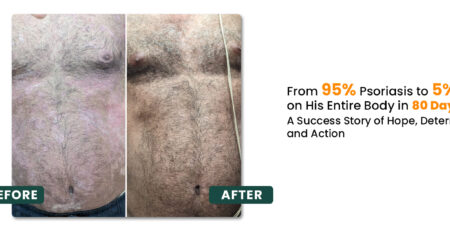Feeling Tired All the Time? Is It Chronic Fatigue Syndrome? Find Out.
Did you know May 12 marks World Chronic Fatigue Syndrome Awareness Day? Chronic Fatigue Syndrome (CFS), also known as Myalgic Encephalomyelitis (ME), is a problem that plagues millions across the globe.
In this, people complain of being tired all the time, no matter what they do. It affects women more than men. You can experience persistent fatigue for more than six months left unaddressed. It only intensifies with physical or mental exertion but does not alleviate with rest.
When you google chronic fatigue syndrome, you are most likely to come across information that nothing can be done and you must live with this condition for a lifetime. But we beg to differ. Most of us forget to address the root cause of chronic fatigue syndrome and think beyond medicine.
Yes, going through it can be very frustrating because your Vitamin D levels may be in check, and you may be eating healthily or sleeping nine hours only to wake up groggy and lethargic. Even caffeine or stimulants may not work for you anymore. You may have a goal in mind but your body and mind don’t support you due to extreme fatigue.
Today we want to help you look at a list of root causes that you can correlate with your lifestyle and tips you can adopt to address chronic fatigue syndrome.
With everything that you read next, understand this. You need not tick the box for every cause. You could be having a couple of these or just one of these. But making that connection with a possible root cause is a good starting point.
Introspect and check if this makes sense to you. If you resonate with any of these root causes, try to change this and see if your energy levels increase.
Here are some possible root causes of chronic fatigue syndrome:

Bacterial infections
Many people live with bacterial infections. For instance, every two or three months, they get stomach bugs that cause chronic stomach pain. You may opt for an antibiotic and feel okay for a few weeks, but then the bug returns.
When you are living with these little bacteria or have superbugs that are resistant to most antibiotics, you may start experiencing chronic fatigue. You may think the antibiotic has worked, but it has not killed the bacteria entirely. This is why you struggle with these bacterial infections and recurrent stomach pains. If left unaddressed, it can head to chronic fatigue syndrome.
Low-grade fevers
Many people have low-grade fevers (99 – 100). It continues for a couple of days. You go to your doctor. If they say there is nothing wrong with you, maybe your immune system has created a low-grade fever because certain bacterias and viruses are resistant to heat. And they may be in small quantities in your body. So, your immune system runs a low-grade fever in the hope to kill it. But when you have a medication to break that low-grade fever, you compromise the immune system.
Does this mean that you shouldn’t go to your doctor when you have a fever? No. Please go and check it out and address the root cause of that low-grade fever. If you have recurrent low-grade fevers, look at it as a clue from your body to work on building your immune system. Make the required change through your medication, food, and lifestyle to avoid bacteria and viruses going undetected and increasing your risk of chronic fatigue syndrome.
Viruses
Viruses are one of the main reasons for chronic fatigue syndrome. For instance, thousands of people live with the Epstein-Barr virus. It is probably the last virus that your doctor would check for. But we can tell you that it affects many, and one symptom it creates is constant fatigue.
How does the virus make you feel tired? It enters your cell and affects the mitochondria (the powerhouse of the cell). The function of the mitochondria is to make energy or ATP (adenosine triphosphate) which are your energy molecules. If you have a dysfunction in your mitochondria, you cannot produce energy.
Imagine if this virus gets into you and starts affecting trillions of cells and you are unable to produce energy. What will you have? Chronic fatigue. So if you have unexplained fatigue, no matter what you do, get tested for the Epstein-Barr virus to check if it is chronic fatigue syndrome.
Some viruses that you need to check because they can lead to chronic fatigue syndrome:
- Epstein-Barr virus
- HPV
- RRV
- Rubella
- Hepatitis
These viruses, even if they do not correlate with your symptoms, if present in the body, can cause chronic damage to your mitochondria and in turn, your energy levels. Check if any of these are the root cause of your chronic fatigue syndrome.
Autoimmune conditions
Autoimmune conditions ranging from psoriasis to eczema, lupus, vitiligo, arthritis, and multiple sclerosis – can drain you of energy at a cellular level. In an autoimmune condition, your cells are being attacked by your immune system, and this can also cause chronic fatigue.
You may want to do panel tests to check if the underlying cause of your fatigue is an autoimmune condition. It will help you take corrective action and adopt the right protocol to increase your energy levels and manage chronic fatigue syndrome under the guidance of your integrative expert.
Recurrent UTIs
Many women struggle with recurrent UTIs (urinary tract infections). They may not necessarily be severe, but you may feel burning sensations in your vagina while passing urine, sometimes accompanied by shivers or a low-grade fever. Sometimes the fever could be so low-grade that you don’t even pick up the symptoms. These can drain your energy. Get a urine culture done to ensure you don’t have any pus cells or bacteria in your urine. Addressing and fixing this may help your energy levels improve.
Pneumonia
All of us cough and sneeze. We blame it on pollution and moisture. Remember, if it persists, it is good to get your lungs checked. Even if you have a small pneumonia patch in your lungs, you could feel drained.
If you are sleep-deprived, binge-watching shows until the wee hours, and have a poor lifestyle, going for a lung check-up will not help. Fix your sleep. When you have exhausted everything, you sleep and eat well but still are chronically fatigued – get your lungs checked. This can lead to chronic fatigue syndrome.
Emotional trauma
Yes, stress can drain excessive amounts of energy from your body. If you are sad, negative, an overthinker, or anxious. If you have resentment, guilt, unforgiveness, envy, or deep-seated anger – don’t overlook these emotions. Address and navigate them. If you are constantly stressed, you will feel drained throughout the day. You cannot sleep at night because your mind is cluttered, and this can also lead to chronic fatigue syndrome.
Vitamin deficiencies
If you are deficient in Vitamin D3 and B12, you may feel chronically fatigued. One in two people is deficient in these. Your energy levels will be low unless you address and decide to fix these deficiencies. We meet patients with levels as low as 1 for Vitamin D3 and 50-60 for Vitamin B12. Within 15 to 20 days of bumping their vitamins, they start feeling energetic. Vitamins play a role in the conversion of food into energy.
You could be eating all the food in the world, but if you do not have the vitamins required to convert it into energy, you will feel chronic fatigue. Identify and fix your vitamin deficiencies.
Gut issues
If you have gut issues (constipation, bloating, flatulence, indigestion, acidity, IBS, etc.), you may experience fatigue. These are inflammatory conditions that drain you of energy. Assess the health of your gut and fix it.
Celiac disease
We have had hundreds of patients who did not even know they were celiac and struggled with fatigue and inflammatory gut symptoms. Only when we made them do a celiac test did they understand that they cannot eat gluten because it was draining their energy and creating inflammation. By simply stopping gluten in these celiac patients, we bumped their energy levels in 24 hours.
This is the impact of knowing what food suits your body and what doesn’t. Inflammatory foods can create inflammation in the cells and mitochondrial dysfunction which equals low energy. Test if you are gluten-intolerant or celiac. Know more about it here.
Mitochondrial dysfunction
This is the root cause of almost every disease and lifestyle condition from cancer to Alzheimer’s. Mitochondrial dysfunction happens when your cells are unable to create energy. When these are damaged by oxidative stress from free radicals and inflammation.
For instance, all of us have cancer cells in us. But these do not get activated into full-blown cancer if your mitochondria is working right.
Every part of your body from your vital organs to your immune system needs energy to help you thrive. Your organs start to die or age when they don’t have the right energy to survive. This energy is dependent on your mitochondrial function, which in turn is dependent on the quality of your lifestyle.
Hypotension
Many people do not check their blood pressure. When they do, they realize they have low blood pressure or hypotension. The moment they start managing that, their energy levels start increasing.
Dehydration
Most people are in air-conditioned environments and do not drink enough water because they don’t feel thirsty. But this is dangerous for your health. Even a 1% drop in hydration can wreak havoc in your body and dip your energy levels due to dehydration. Hydrate adequately. Learn the art of drinking water here.
Fad diets
If you are following fad and restrictive diets that keep you off carbs or keep fat low in your body, you will be low on energy. You may lose some weight at the start but will put it back on. It is the yo-yo effect. Beyond these, fad diets also create immense damage at a cellular level. It’s not even worth the little weight you may have lost.
Chemotherapy and radiation
Mitochondrial dysfunction is a known side effect of conventional treatments like chemotherapy and radiation. But working with an integrative expert on managing the side effects of your treatment can help. Chemo and radiation also deplete your B vitamins which may explain why you feel tired and weak. Add B vitamins through your food or supplements under the guidance of your healthcare expert. Balance your treatment with nutrition and your lifestyle changes.
Excess toxins
If you have too many toxins, you may start feeling tired and nauseous because it slows down your liver. This can lower energy levels and lead to chronic fatigue syndrome. Keep your liver clean. Know more about how to keep your liver healthy here.
Sleep deprivation
Whether you have insomnia or are oversleeping (more than 9 hours) – it can cause chronic fatigue. How many of you overslept and felt lethargic throughout the day? You may wonder, “If I overslept, I should have more energy, right?” Remember, too much of anything is bad for your health. Look at fixing your sleep patterns and aligning them to the circadian rhythm.
Hormonal imbalances
Most people live with hormonal imbalances. If you have too much or too little testosterone, estrogen, progesterone, insulin, or thyroxine – each of these are hormones. Whether you have thyroid-related issues, diabetes, PCOD, er+ breast cancer, or ovarian cancer – these point to a hormonal imbalance. You need to address and manage this better to improve your energy levels and reduce the risk of chronic fatigue syndrome.
More lifestyle tips to address Chronic Fatigue Syndrome
- Exercise. No over-exercising or under-exercising.
- Yoga
- Pranayama. The more you oxygenate your cells, the better they will use food, water, and oxygen to create energy.
- Deep breathing. Most people do not breathe the right way. Test your breathing right now. Are you breathing to your full capacity? When we practice breathwork, we train our lungs to automatically breathe the right amount of oxygen and leave the right amount of carbon dioxide. The more pranayama you do, the stronger your lungs. Good lung capacity will help you manage your chronic fatigue syndrome better.
- Stop overdoing caffeine. Constantly downing coffee may make you feel alert for a bit, but it will give you the worst energy crash and make you feel fatigued. Caffeine hits everyone differently. Find what works for you.
- Limit your alcohol and smoking.
- Eat meals rich in B vitamins. Add legumes, lentils, nuts, and seeds to your plate. If your doctor prescribes a B vitamin supplement while undergoing treatment, take it. Sometimes you need the assistance of good quality supplements.
- Coenzyme Q10 (CoQ10) is an antioxidant that is naturally produced in your body. Your cells use CoQ10 for growth, energy and maintenance. Your CoQ10 levels decrease as you age. People who are on statins or those going through chemotherapy and radiation may already be on it. If you have depleted CoQ10, you will feel fatigued throughout the day. Ensure you have the right amount of CoQ10 so that you have the right amount of energy to get you through your day.
If you are constantly fatigued, you may want to see if you meet one or many of these points. There is always a solution. If you look at chronic fatigue syndrome and think you need to live with it for a lifetime, you may not end up taking any action. Change begins in the mind. Several changes can help you manage your chronic fatigue syndrome and improve the quality of your life.
Address the root cause if your chronic fatigue syndrome and change your lifestyle.
ALSO WATCH: Understanding CFS – Chronic Fatigue Syndrome
Need personalized guidance to address your chronic fatigue syndrome?
We help you find a way.
Join our You Care Wellness Program
Set up a one-on-one consultation with our integrative team of experts.
Get in touch with us on WhatsApp, call us at 1800 102 0253 write to us at info@lukecoutinho.com.
RELATED READINGS
3 Reasons Why You Wake Up Tired Every Morning
Why Skipping Meals Is the Worst Mistake You Can Make!
3 Scientifically Proven Lifestyle Changes That Are Helping Thousands of Our Clients Sleep Better
How To Deal With Migraines? Causes, Symptoms, and Possible Fixes
|
From a pimple to cancer, our You Care Wellness Program helps you find a way Talk to our integrative team of experts today 18001020253 |










Leave a Reply